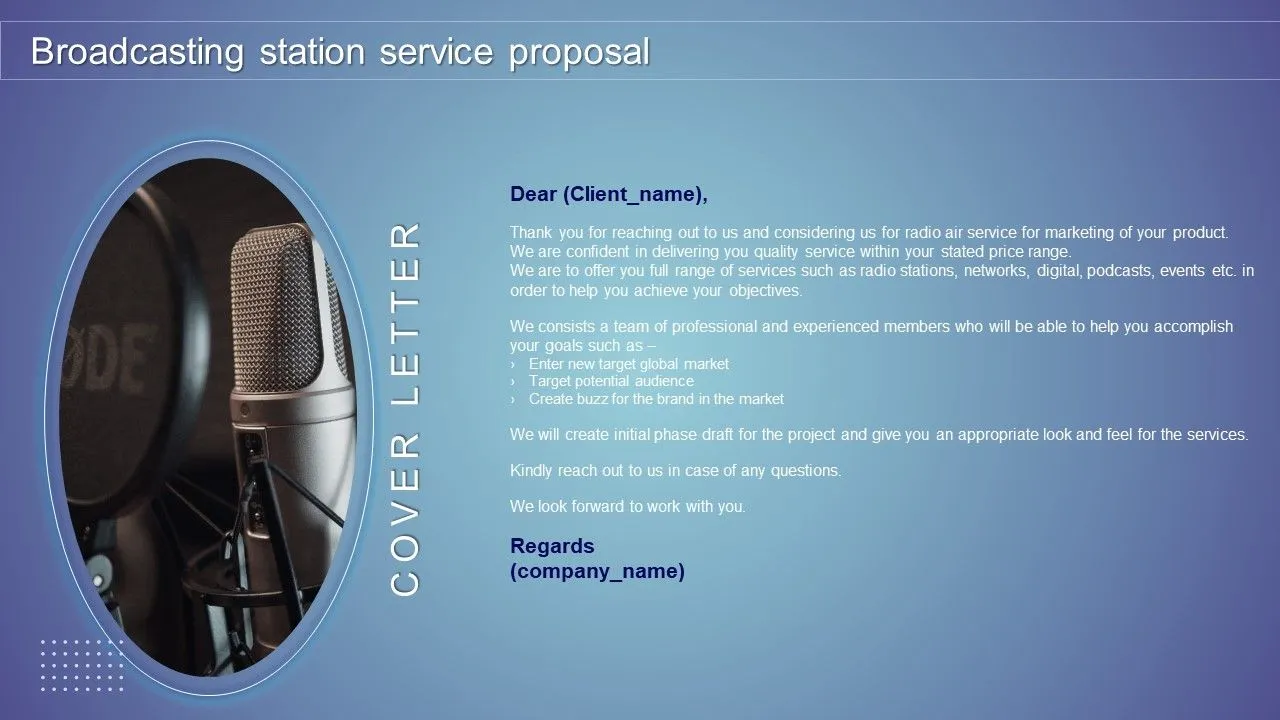Crafting a Winning Broadcast Cover Letter
A cover letter is your first introduction to a potential employer, and in the competitive world of broadcasting, it’s crucial to make a strong impression. A well-crafted cover letter can set you apart from other applicants and significantly increase your chances of landing an interview. This guide provides actionable tips to help you create a cover letter that highlights your skills, experience, and passion for broadcasting, ultimately leading to your dream job. The key is to showcase your unique value proposition and demonstrate why you are the ideal candidate for the role. Remember to tailor each letter to the specific job and organization you are applying to, as this shows you’ve done your research and are genuinely interested in the opportunity. A generic cover letter is easily recognizable and unlikely to catch the hiring manager’s attention. Your goal is to present yourself as a dedicated and enthusiastic professional, ready to contribute to the success of their broadcasting team.
Understanding the Broadcasting Industry Landscape
Before you even begin writing your cover letter, understanding the current broadcasting landscape is essential. The industry is constantly evolving, with new technologies and trends emerging regularly. Researching the specific areas within broadcasting that interest you, such as news, sports, radio, or television production, will help you tailor your cover letter to showcase your relevant skills and knowledge. Familiarize yourself with industry-specific terminology, key players, and current challenges. This demonstrates that you are not only passionate about broadcasting but also informed about the industry’s nuances. Staying updated with industry news through reputable sources like Broadcasting & Cable or Radio World is also a good practice. This knowledge will also inform your application and give you insights during interviews. Consider the different types of roles available, from on-air personalities to behind-the-scenes production staff, and identify the ones that best align with your career goals. This understanding ensures you can articulate your career objectives with clarity and focus in your cover letter.
Researching the Broadcasting Organization
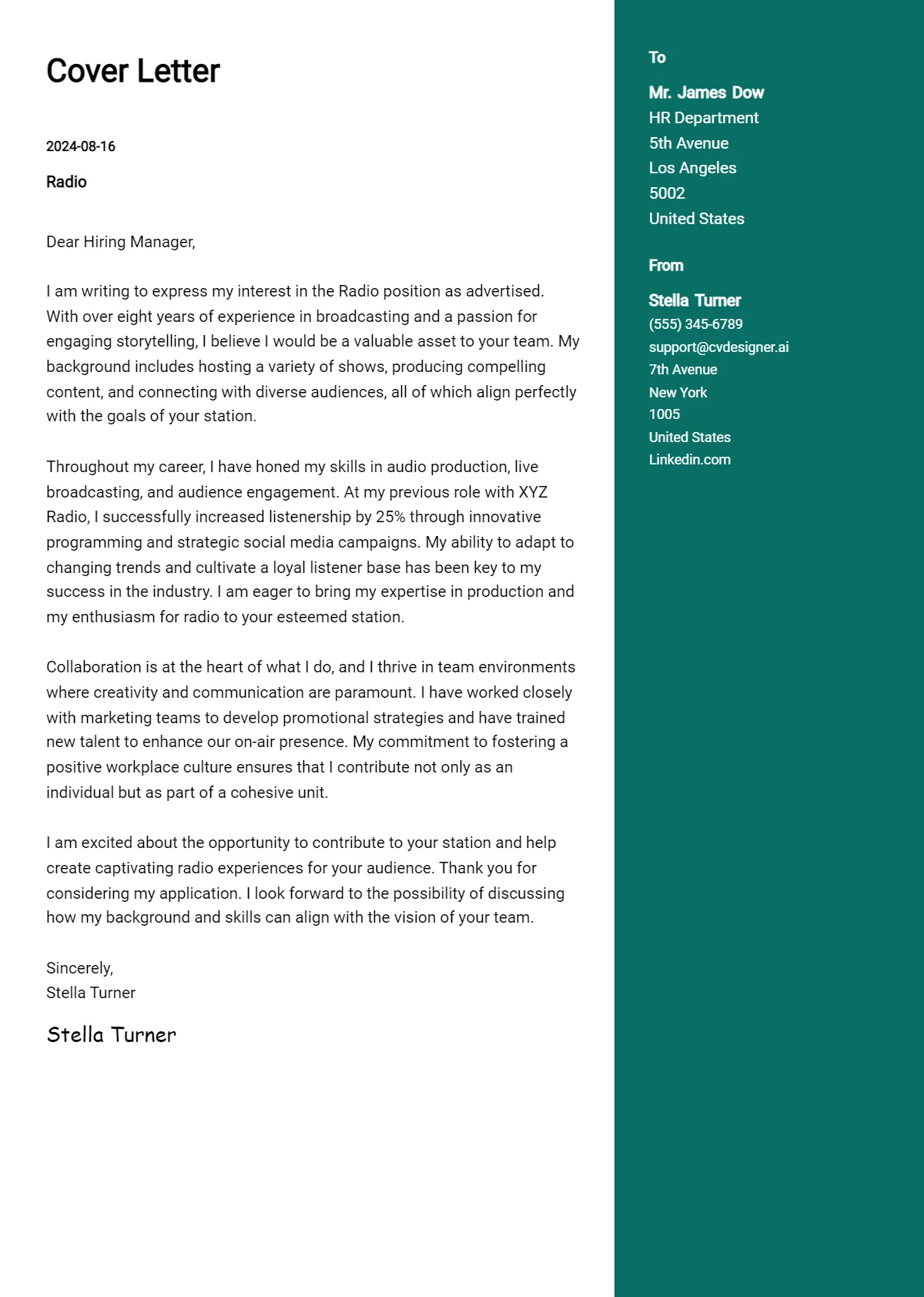
Thorough research on the broadcasting organization you are applying to is paramount. Visit their website, explore their social media presence, and listen to their programming or watch their content. Identify their target audience, their mission, and their core values. This research will allow you to tailor your cover letter to resonate with the organization’s specific needs and culture. Mention specific programs, projects, or initiatives that have impressed you, demonstrating your genuine interest and knowledge of their work. If possible, try to find information about the hiring manager or the team you would be working with. Personalizing your cover letter with this information can significantly increase your chances of getting noticed. This level of detail shows that you are not just sending out a generic application but are genuinely interested in joining their team. Also, try to understand the organization’s recent achievements, challenges, and goals. This knowledge will allow you to show how your skills and experience can contribute to their success.
Highlighting Relevant Skills and Experience
Your cover letter is your opportunity to showcase your skills and experience in a compelling way. Focus on the skills that are most relevant to the job description, such as communication, writing, editing, technical proficiency, and any specific software or equipment knowledge. Provide specific examples of how you have utilized these skills in previous roles or projects. Quantify your achievements whenever possible. For example, instead of saying you ‘increased social media engagement,’ state that you ‘increased social media engagement by 30% within six months.’ This demonstrates your ability to deliver tangible results. Use action verbs to describe your accomplishments and responsibilities. Examples include ‘produced,’ ’edited,’ ‘managed,’ ‘created,’ and ‘implemented.’ Tailor your skills section to align with the specific requirements of the job. If the role requires experience with video editing software, make sure to highlight your proficiency with programs like Adobe Premiere Pro or Final Cut Pro.
Tailoring Your Cover Letter for Each Application
Avoid using a generic cover letter template for all applications. Each job you apply for is unique, and your cover letter should reflect that. Customize your cover letter to address the specific requirements and preferences of each employer. Review the job description carefully and identify the key skills and experiences the employer is seeking. Then, highlight your qualifications that align with these requirements. Research the organization and tailor your letter to reflect their values and culture, as mentioned earlier. Refer to specific projects, programs, or initiatives of the organization to demonstrate your genuine interest. This tailored approach shows that you have taken the time to understand the role and the organization, increasing your chances of getting noticed. Moreover, personalization shows you are committed and willing to go the extra mile. Remember to change the name of the hiring manager and the job title to fit the specific application. Do not make any mistakes by using a generic template.
Showcasing Your Passion for Broadcasting
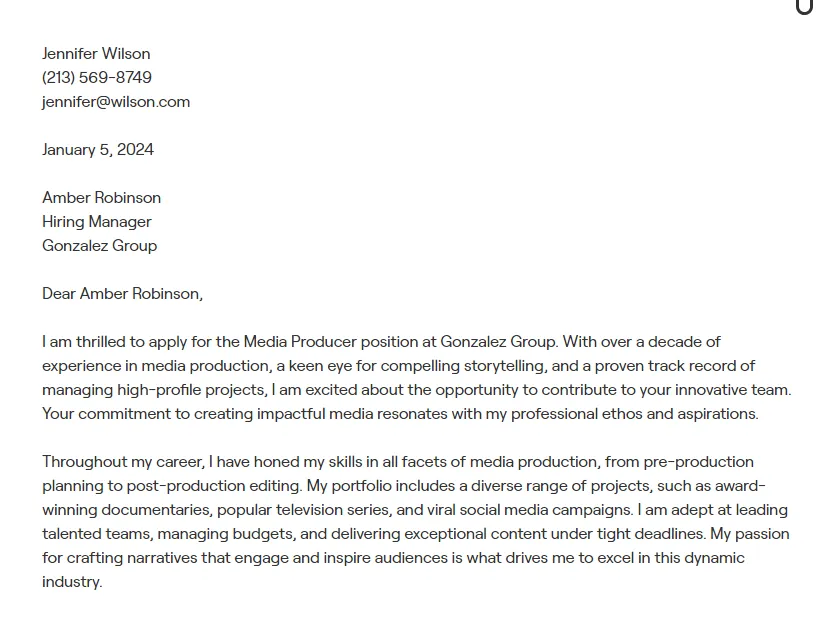
Passion is a crucial element in the broadcasting industry, and your cover letter should convey your enthusiasm for the field. Express your genuine interest in broadcasting and explain why you are drawn to it. Share specific examples of how you have pursued your passion, such as volunteering at a local radio station, creating your own podcast, or participating in broadcasting-related projects. Talk about what excites you about the specific role and the organization. Do you admire their commitment to local news, their innovative programming, or their strong community engagement? Mentioning these details will demonstrate your genuine interest. Your passion should be evident in your tone and writing style. Use descriptive language and vivid examples to bring your enthusiasm to life. Remember, employers seek candidates who are not just skilled but also passionate about the industry and the work they do. This passion will sustain you through the long hours and fast-paced environment of broadcasting.
Structuring Your Broadcast Cover Letter
A well-structured cover letter is easy to read and makes a positive impression. Follow a clear and concise format with the following sections: your contact information, the date, the hiring manager’s contact information (if known), a professional salutation, an opening paragraph, a body paragraph or two, a closing paragraph, and a professional closing. Start with a compelling opening that grabs the reader’s attention. This could be a brief statement about why you are interested in the role, an impressive accomplishment, or a reference to a shared connection. The body paragraphs should highlight your relevant skills and experience, providing specific examples to support your claims. The closing paragraph should reiterate your interest, summarize your key qualifications, and include a call to action, such as requesting an interview. Proofread your cover letter carefully to ensure it is free of any errors in grammar, spelling, or punctuation. A well-structured and error-free cover letter demonstrates professionalism and attention to detail, crucial qualities in broadcasting.
The Importance of a Strong Opening
The opening paragraph of your cover letter is the most critical part, as it sets the tone and captures the reader’s attention. Start with a strong hook that immediately grabs the hiring manager’s interest. Consider mentioning how you learned about the job opening, expressing your excitement about the opportunity, or highlighting a key achievement that aligns with the role. Avoid generic openings like ‘I am writing to express my interest in the position.’ Instead, be specific and show your enthusiasm. If you have a connection with the organization, such as a mutual acquaintance or a shared interest, mention it in the opening. This can help to establish a personal connection and make you stand out. Ensure your opening paragraph is concise and clearly states the purpose of your letter, the specific role you are applying for, and a brief overview of your key qualifications. Your opening should be captivating and relevant to the job, making the hiring manager want to read the rest of your letter.
Demonstrating Your Achievements and Accomplishments
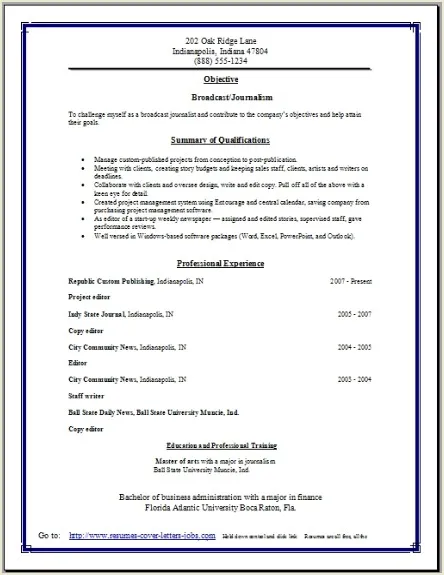
Rather than simply listing your job duties, focus on demonstrating your achievements and accomplishments in previous roles. Use the STAR method (Situation, Task, Action, Result) to provide specific examples of how you have made a positive impact. Describe the situation you faced, the task you were assigned, the actions you took, and the results you achieved. Quantify your accomplishments whenever possible. For example, instead of saying you ‘managed social media,’ state that you ‘increased social media followers by 40% within six months.’ Highlighting your achievements demonstrates your ability to deliver results and adds credibility to your cover letter. Showcase your ability to solve problems, overcome challenges, and exceed expectations. Tailor your examples to the specific requirements of the job. If the role requires experience with news reporting, provide examples of your reporting skills, such as breaking news stories or conducting interviews. Demonstrating your accomplishments will show employers how you can benefit their organization.
Quantifying Your Results in Broadcasting
In the broadcasting industry, as with any profession, quantifying your results is crucial for demonstrating your impact and value. Whenever possible, use numbers and metrics to showcase your achievements. Instead of saying you ‘improved ratings,’ specify that you ‘increased radio listenership by 15% in the target demographic.’ Use data to support your claims and show the direct impact of your work. Examples include the number of stories you produced, the ratings your show achieved, the growth in social media followers, or the revenue generated from advertising. Quantifying your results not only demonstrates your accomplishments but also provides a clear picture of your abilities to potential employers. If you have experience with audience engagement, quantify the increase in audience participation, such as the number of calls received, the number of comments on social media, or the number of website visits. When describing your editing skills, quantify how much time you saved during production through effective editing techniques. Highlighting your results using metrics and providing numbers will show employers how you have a positive influence in the work environment.
Emphasizing Your Communication Skills
Effective communication is a cornerstone of the broadcasting industry, so your cover letter should highlight your strong communication skills. Demonstrate your ability to communicate clearly, concisely, and persuasively, both verbally and in writing. Provide examples of how you have used your communication skills in previous roles or projects. Mention your experience with public speaking, interviewing, or writing scripts. Tailor your communication style to the specific role and organization. For example, if you are applying for a news anchor position, emphasize your ability to deliver information with clarity and professionalism. If you are applying for a social media role, highlight your ability to engage with audiences and create compelling content. Your cover letter itself is a form of communication, so ensure your writing is clear, well-organized, and free of errors. Proper grammar and spelling demonstrate your attention to detail, a valuable skill in broadcasting.
Including a Compelling Call to Action
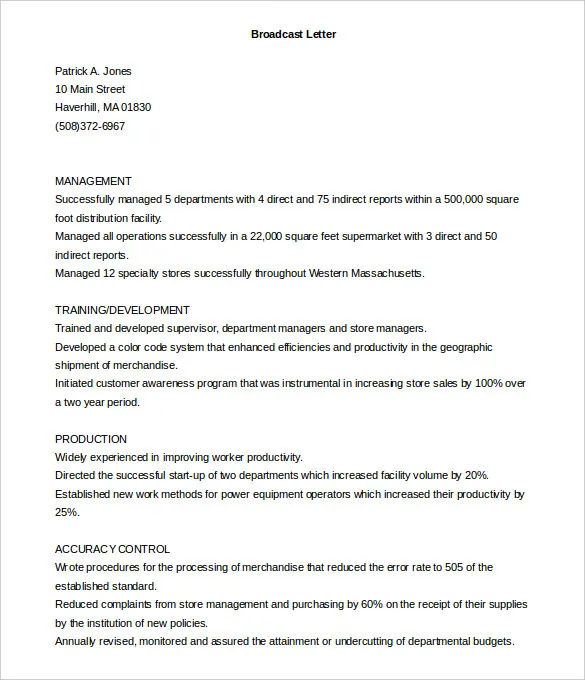
A compelling call to action encourages the hiring manager to take the next step and contact you. In your closing paragraph, clearly state what you want the hiring manager to do. Instead of a generic closing like ‘Thank you for your time,’ try something more specific, such as ‘I am eager to discuss how my skills and experience can contribute to your team, and I welcome the opportunity to speak with you further.’ Make it easy for the hiring manager to contact you by including your phone number and email address in your contact information. If you have a portfolio or website, provide a link to your work. Your call to action should be specific, enthusiastic, and tailored to the role. It should leave the hiring manager with a clear understanding of what you want and how they can reach you. A well-executed call to action increases the likelihood of receiving an interview invitation and moving forward in the hiring process.
Proofreading and Editing Your Cover Letter
Proofreading and editing your cover letter is essential to ensure it is polished and professional. Errors in grammar, spelling, or punctuation can undermine your credibility and make a negative impression on the hiring manager. Before submitting your cover letter, carefully proofread it yourself. Read it aloud to catch any awkward phrasing or typos. Use grammar and spell-checking tools, but don’t rely on them entirely; they may not catch all errors. Ask a friend, family member, or career advisor to review your cover letter. A fresh pair of eyes can catch errors that you might have missed. Check the letter for formatting errors, such as inconsistent spacing or font sizes. Make sure the letter is easy to read and visually appealing. Proofreading and editing are crucial steps in the application process, and a well-edited cover letter demonstrates attention to detail and professionalism, which are critical qualities in broadcasting.
Common Mistakes to Avoid in Your Broadcast Cover Letter
Avoiding common mistakes can significantly improve your cover letter and increase your chances of success. One major mistake is sending a generic cover letter that is not tailored to the specific job or organization. Avoid using clichés and overly formal language. Focus on showcasing your unique skills and experience instead. Another common mistake is including irrelevant information or rambling on about unrelated topics. Keep your cover letter concise and focused on the job requirements. Avoid making negative statements about previous employers or colleagues. Focus on the positive aspects of your experience and the value you can bring to the organization. Do not include spelling, grammar, or formatting errors. Always proofread and edit your letter carefully. Avoid being overly aggressive or demanding in your tone. Maintain a professional and respectful demeanor. By avoiding these common mistakes, you can ensure your cover letter effectively highlights your qualifications and makes a positive impression on the hiring manager.
Formatting Your Cover Letter Professionally
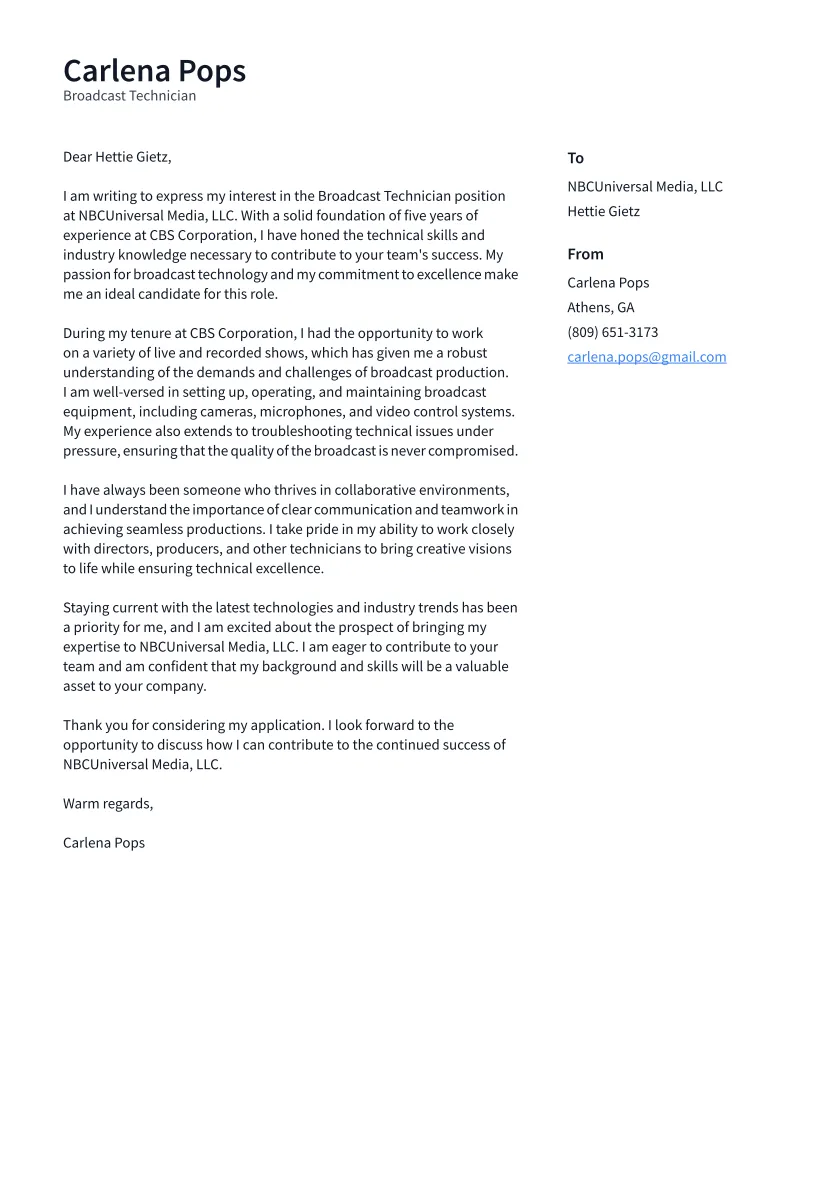
Professional formatting enhances the readability and visual appeal of your cover letter. Choose a clean and easy-to-read font, such as Arial, Times New Roman, or Calibri, and use a font size between 10 and 12 points. Use single spacing within paragraphs and double spacing between paragraphs. Include your contact information at the top of the letter, including your name, phone number, email address, and LinkedIn profile link. Use proper headings and subheadings to organize your content and make it easy for the hiring manager to scan. Keep your cover letter concise, ideally no more than one page. Use bullet points to highlight key achievements and skills. Maintain consistent formatting throughout the document. Ensure your margins are set at 1 inch on all sides. A well-formatted cover letter demonstrates professionalism and attention to detail, making a positive impression on the hiring manager. Ensure that it looks organized and clean.
Utilizing Keywords for Applicant Tracking Systems (ATS)
Many broadcasting companies use Applicant Tracking Systems (ATS) to screen cover letters and resumes. These systems scan your documents for keywords related to the job requirements. To increase your chances of passing through the ATS, carefully review the job description and identify the key skills, qualifications, and keywords the employer is seeking. Incorporate these keywords naturally throughout your cover letter. Avoid keyword stuffing, which can make your cover letter appear unnatural and spammy. Use a variety of synonyms and related terms to diversify your keyword usage. Place the keywords in relevant sections of your cover letter, such as the skills section, the experience section, and the opening and closing paragraphs. Pay close attention to the specific terminology used in the job description. Using the same language will increase your chances of being selected by the ATS. Even if the ATS doesn’t pick up on a keyword, the hiring manager will. This practice is good for the overall structure and clarity of your application.
Seeking Feedback on Your Cover Letter
Before submitting your cover letter, seek feedback from trusted sources. Ask friends, family members, career advisors, or mentors to review your cover letter and provide constructive criticism. Ask them to assess the clarity, organization, and content of your letter. Does it effectively highlight your skills and experience? Does it convey your passion for broadcasting? Does it meet the requirements of the job description? Pay close attention to their feedback and make revisions as needed. Consider seeking feedback from professionals in the broadcasting industry. They can provide valuable insights and help you tailor your cover letter to industry standards. Don’t be afraid to ask for multiple rounds of feedback. The more you refine your cover letter, the better your chances of making a positive impression on potential employers. Seeking feedback is a crucial step in the job search process, and it can significantly improve the quality of your cover letter and increase your chances of success. Also, consider the feedback given and incorporate it.
